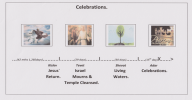CELEBRATIONS
`Behold, I create Jerusalem as a rejoicing, and her people a joy. I will rejoice in Jerusalem and joy in my people; the sound of weeping shall no longer be heard in her, nor the voice of crying.` (Isa. 65: 18 & 19)
`And they shall call them The Holy People. The Redeemed of the Lord; and you shall be called Sought Out, A City Not Forsaken.` (Isa. 62: 11 & 12)
The people of Israel who come through the great tribulation and on to the last months of the year, are called `blessed.` Their nation seemed devastated but their Messiah came and delivered them from the `lawless one` and his great army.
`Blessed is he who waits and comes to the 1,335 days.` (Dan. 12: 1, 11 & 12)
It is therefore a time of sorrow turned to joy, feasting and thanksgiving. The holiday is called Purim and celebrated on Adar 15th in Israel remembering the time when the Jews successfully fended off their enemies and experienced the joy of deliverance in the time of Esther. (Esther 9: 20 – 22)
`And Mordecai wrote these things and sent to all the Jews who were in all the provinces of King Ahasurerus, both near and far, to establish among them that they should celebrate yearly the 14th and 15th days of the month of Adar, as the days on which the Jews had rest from their enemies, as the month which was turned from sorrow to joy for them, and from mourning to a holiday; that they should make days of feasting and joy, of sending presents to one another and gifts to the poor.` (Esther 9: 20 - 22)
Thus, the last month, Adar had previously been a celebration of the overcoming of their enemies in the time of Esther, but now they see that their Messiah has brought the fulfilment of national deliverance to them as a nation.
These celebrations of National Deliverance, called Purim are 4 weeks exactly preceding Passover. This then leads into the Feast of Tabernacles, starting with the New Year.
The Feast of Tabernacles.
`And it shall come to pass that everyone who is left of all the nations which came against Jerusalem shall go up from year to year to worship the King, the LORD of hosts, and to keep the Feast of Tabernacles.` (Zech. 14: 16)
`Behold, I create Jerusalem as a rejoicing, and her people a joy. I will rejoice in Jerusalem and joy in my people; the sound of weeping shall no longer be heard in her, nor the voice of crying.` (Isa. 65: 18 & 19)
`And they shall call them The Holy People. The Redeemed of the Lord; and you shall be called Sought Out, A City Not Forsaken.` (Isa. 62: 11 & 12)
The people of Israel who come through the great tribulation and on to the last months of the year, are called `blessed.` Their nation seemed devastated but their Messiah came and delivered them from the `lawless one` and his great army.
`Blessed is he who waits and comes to the 1,335 days.` (Dan. 12: 1, 11 & 12)
It is therefore a time of sorrow turned to joy, feasting and thanksgiving. The holiday is called Purim and celebrated on Adar 15th in Israel remembering the time when the Jews successfully fended off their enemies and experienced the joy of deliverance in the time of Esther. (Esther 9: 20 – 22)
`And Mordecai wrote these things and sent to all the Jews who were in all the provinces of King Ahasurerus, both near and far, to establish among them that they should celebrate yearly the 14th and 15th days of the month of Adar, as the days on which the Jews had rest from their enemies, as the month which was turned from sorrow to joy for them, and from mourning to a holiday; that they should make days of feasting and joy, of sending presents to one another and gifts to the poor.` (Esther 9: 20 - 22)
Thus, the last month, Adar had previously been a celebration of the overcoming of their enemies in the time of Esther, but now they see that their Messiah has brought the fulfilment of national deliverance to them as a nation.
These celebrations of National Deliverance, called Purim are 4 weeks exactly preceding Passover. This then leads into the Feast of Tabernacles, starting with the New Year.
The Feast of Tabernacles.
`And it shall come to pass that everyone who is left of all the nations which came against Jerusalem shall go up from year to year to worship the King, the LORD of hosts, and to keep the Feast of Tabernacles.` (Zech. 14: 16)

